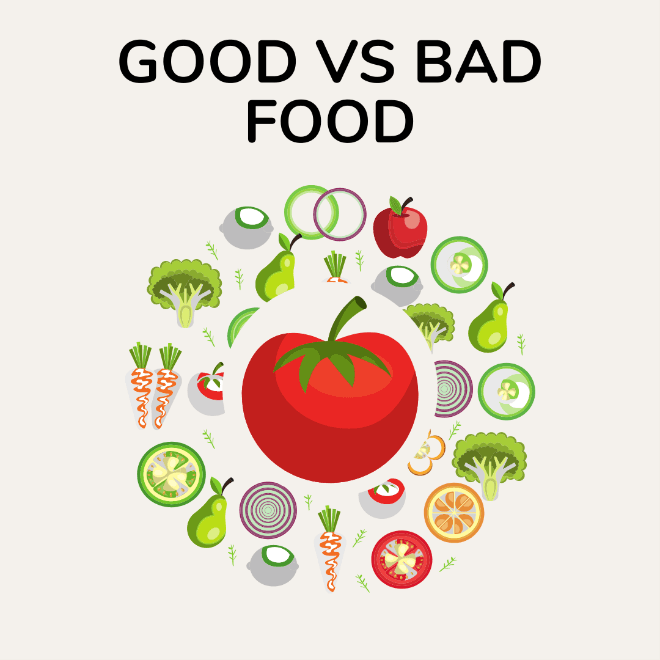

It's commonplace in society to label foods as 'good' or 'bad'. But is this the right thing to do?
In this short post, I'll be discussing the pros and cons of labelling foods. I'll then give my own opinions on the matter, as a qualified nutritionist and weight loss specialist.
What Does Labelling Food Mean?
Labelling food simply means assigning some kind of positive or negative value to foods. For example, you could be of the opinion that potato chips are a 'bad' food and apples are 'good' food.
Some common examples of 'good' and 'bad' foods, as widely accepted by society, are:
Good Foods
- Fruits
- Vegetables
- Nuts
- Seeds
- Grains
- Legumes
Bad Foods
- Ice cream
- Chocolate
- Lollies
- Pastries
- Takeaway food
Does that sound about right to you? What other foods would you put under these two categories?
The Benefits Of Labelling Foods
Labelling foods can be good for a couple of reasons.
It Can Be A Good Indicator
First and foremost, having a general idea of what foods are 'good' and 'bad' can serve as an indicator for what foods you should consume a lot of, and what foods you should rarely consume. If you're not well versed in nutrition, your 'gut feeling' of what foods are 'good' and what foods are 'bad' could potentially allow you to live a relatively healthy life.
It Can Save Some Time
Labelling foods also simplifies the whole nutrition process, which can save time and energy. For example, instead of having to spend time looking at the nutritional panel and the ingredients list of every product, you buy at the supermarket, having a general knowledge of 'good' and 'bad' foods could allow you to just throw things into your shopping trolley and ultimately save a lot of time.
However, as with all things, there are arguments on both sides. So, let's now consider the cons of labelling foods.

The Disadvantages Of Labelling Foods
What if we took a step back and stopped labelling foods as ?good? and ?bad?? Could this be beneficial? Well, there are a few arguments in favour of why you shouldn't label foods.
There's No Consistency
First of all, who gets to determine what foods are good and bad? And what factors do they consider when putting each food into a certain category?
For example, is a certain food considered 'bad' if it is high in sugar? High in carbs? High in fats? High in calories? Has a lot of ingredients and preservatives? All of the above?
Because fruit and honey are high in sugar; brown rice, potato, quinoa, couscous and wholemeal bread and wholemeal pasta are all high in carbs; nuts, avocado, seeds and olive oil are all high in fats; peanut butter, sweet potato, almond butter and granola are all high in calories; protein bars have a lot of ingredients and preservatives. Does that mean we should classify all of these foods as bad?
...Of course not!
My point is that there's not really any true consistency or scale that people use when labelling foods as 'good' or 'bad'. Most people typically just use their intuition.... And often that intuition can be wrong, especially for people that don't know too much about health and nutrition. (Which I'm willing to bet is most of society, since 67% of adult Australians are overweight.)
Creates Feelings Of Guilt
By labelling foods as 'good' or 'bad' you're putting a lot of pressure on yourself to stick to the 'good' foods. If for whatever reason you eat a certain food that you think is bad, you're quite likely to regret your choice later on and feel guilty for eating that food.
Ultimately, this can lead to a whole host of other psychological problems and behaviours, which I'll brush on in the next reason below.
Binge Eating
By depriving yourself of 'bad' foods (which often, are people's favourite foods), you're setting yourself up to binge eat.
Everyone knows that when you tell someone NOT to do something, they feel a certain temptation to do that thing... That's our inner rebel and curiosity getting the best of us. It's the same with food. If you tell yourself that you can't eat the 'bad' foods, all you'll be able to think about is eating those foods; and eventually, something will happen in your life (e.g. you're at a social outing, you're sad, stressed etc.) and you'll just crack under pressure and consume a heck of a lot of those 'bad' foods.
As a nutritionist, I see this time and time again with my clients.

What I Believe?A Nutritionist's Opinion
In short, I believe that you should NOT be labelling foods.
Sure?I don?t want to come across as naďve? I understand perfectly well that some foods have better nutritional value than others. However, labelling foods as good or bad can lead to feelings of guilt and ultimately affect your mental health.
For example, you may only eat ?bad? foods on the weekend because you think that they are ?bad? to eat during the week. By having this mindset, you?re only setting yourself up to have a negative relationship with food.
If you want chocolate on a Wednesday, then eat it. If you want vegetables on a Wednesday, then eat the vegetables. Rather than trying to control days of ?good? and ?bad? food, eat in a way that nourishes your body and your soul.
Eat in a way that makes you feel good. No fear, no restrictions, no guilt.
Of course, there are limits to this. You can?t expect to lose weight on a diet of chocolate and mountain dew. However, finding balance in your everyday life is absolutely key in losing weight and sustainably keeping it off.
Feel in control of your actions and treat your body with the respect it deserves, and you'll be able to live a healthy lifestyle that's both sustainable and enjoyable.
What Next?
If you enjoyed this post and want to learn more about nutrition and weight loss, then I'd highly recommend checking out my post on whether eating fruit impacts weight loss or this post on what I eat in a day (as a nutritionist).